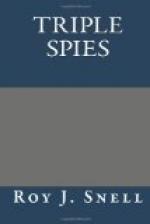“Eh-eh” (yes), the other agreed.
“Then what in thunder!” Johnny exclaimed, falling back on English. “He tried to kill me. Kill me! Do you understand? Why shouldn’t I kill him?”
“No kill,” said the Eskimo stubbornly.
Johnny sat and thought for a full three minutes. In that time, his blood had cooled. He was able to reason about the matter. In the army he had learned one rule: “If someone knows more about a matter than you do, follow his guidance, though, at the time, it seems dead wrong.” Evidently Iyok-ok knew more about this Russian than Johnny did. Then the thing to do was to let the man go.
Before releasing him, he searched him carefully. Beyond a few uninteresting papers, a pencil, a cigaret case and a purse he found nothing. Evidently the revolver had been his only weapon.
As he searched the man, one peculiar question flashed through Johnny’s mind; if the Russian had the envelope full of diamonds on his person, what should he do, take them or leave them? He was saved the necessity of a decision; they were not there.
“Now,” said Johnny, seating himself on a rusty pan, as the Russian went shuffling out of the mine, “tell me why you didn’t let me kill him.”
“Can’t tell,” was Iyok-ok’s laconic reply.
“Why?”
“Not now. Sometime, maybe. Not now.”
“Look here,” said Johnny savagely, “that man has tried to kill me or have me killed, three times, is it not so?”
Iyok-ok did not answer.
“First,” Johnny went on, “he induces the reindeer Chukches to try to kill me and furnishes them the knife to do it with. Eh?”
“Maybe.”
“Second, he drops a harpoon into my igloo and tries to harpoon me and blow me up.”
“Maybe.”
“And now he puts a revolver to my head and pulls the trigger. Still you say ‘No kill.’ What shall I make of that?”
“Canak-ti-ma-na” (I don’t know), said the Eskimo. “No kill, that’s all.”
Johnny was too much astonished and perplexed to say anything further. The two sat there for some time in silence. At last the Eskimo rose and made his way toward the entrance.
Johnny flashed his light about the place. He was looking for his sack of gold. Suddenly he uttered an exclamation and put out his hand. What it grasped was the envelope he had seen in the Russian’s pocket at Wo Cheng’s shop, the envelope of diamonds. And the diamonds were still there; he could tell that by the feel of the envelope.
Hastily searching out his now insignificant treasure of gold, Johnny placed it with the envelope of diamonds in his inner pocket and hurried from the mine.
Darkness again found him musing over a seal oil lamp. He was not in a very happy mood. He was weary of orientalism and mystery. He longed for the quiet of his little old town, Chicago. Wouldn’t it be great to put his feet under his old job and say, “Well, Boss, what’s the dope to-day?” Wouldn’t it, though? And to go home at night to doll up in his glad rags and call on Mazie. Oh, boy! It fairly made him sick to think of it.




